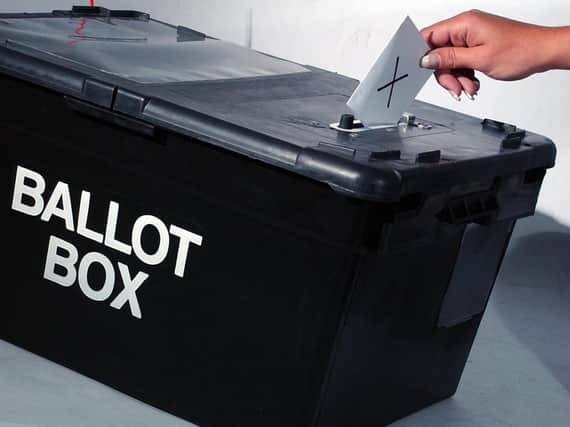David Hoey: Unionism was restless, even before the events of this weekend


The reasons are many, though the general sense is that older established parties are simply running out of steam, left, right and centre.
There is no reason Northern Ireland should be immune from these unsettled times. Trump in the USA.
Advertisement
Hide AdAdvertisement
Hide AdIn Europe, populist right Fdl (Brothers of Italy) in Italy, overtaking 5 Star, and Lega (LSP) replacing Lega Nord are now in government.
In Spain knocking at the door of established parties are separatists along with populist upstarts on the left, Podemos and Sumar, and on the right, VOX. In neighbouring Portugal, populist Chega surged into the political space earlier this year. In France Macron was once the disruptive force in France with En Marche, now Renaissance. The forever populist Front National (now National Rally) has a realistic chance of taking the Presidency next time.
In the Netherlands the most avowedly populist right Geert Wilders’s Party for Freedom won more seats than any other party. Germany has the AfD, populist, centre-right, continuing to make strides in polls and elections. Hungary seems in permanent populist mode. Poland’s populists PiS remain a substantial presence. The Swedish Democrats is now the second largest Party and in government.
In the UK, when the Conservative Party not doing its best to destroy itself, Reform is nipping at the Tories’ heels in the polls. The Labour Party had its moment with Corbyn; although stable for now the recent Rochdale election shows that pressures on the populist left are far from over.
Advertisement
Hide AdAdvertisement
Hide AdIn the Republic of Ireland, until recently, Sinn Fein was riding a populist wave against the establishment, shapeshifting left or right as any populist would. Being a populist wannabe government however has risks, and having joined the government parties one same side in two “progressive’ referenda it caught the same cold. Now there are nascent groups among collaborating independents, including Independent Ireland https://www.independentireland.ie with three existing TDs.
What then of Northern Ireland?
The same populist/progressive alliance as drove the Republic’s referenda is present, with Sinn Fein and Alliance in step; the SDLP shuffling alongside somewhere. Some in the Ulster Unionists have found merit in this political space, though seeming awkward and unconvincing. Even the DUP has been shuffling along, denouncing ideas from the progressive/populist front from time to time but then shrugging and moving on.
The progressive and/or populist approach offers little to unionism. It rarely translates into practical or coherent policy and abhors rationality. Nor are there clear limits to ‘how far?’ – the downfall of Sturgeon and Varadkar clearly ‘too far’ with hindsight.
Twenty-five years of Stormont provides little evidence that an approach justified as ‘progressive’ or offering populist measures or measures wrapped in a flag, delivers much by way of good government.
Advertisement
Hide AdAdvertisement
Hide AdTalk of ownership of Lough Neagh doesn’t and won’t address underlying environmental damage. RHI was popular, until it wasn’t. Legislating for free parking at hospitals was a popular measure with an election in the offing, while eventually back in reality it is proving impossible to implement without taking funds away from frontline health. Audit Office reports seem to forever draw attention to alarmingly similar failure – the concept of ‘learning from mistakes’ apparently alien to Stormont.
Significant public policy failures are highlighted year after year, mandate after mandate. Water and waste management, transport and infrastructure, education, justice (policing and prisons) and, most pressing of all, health and social care: all need more than money alone to fix issues that are ‘progressively’ debilitating our public services.
The political pack in the assembly has been shuffled from time over twenty-five years. Nothing has changed. Services have deteriorated progressively; popular measures have tended only to exacerbate the funding shortfalls elsewhere. More of the same is no longer acceptable, but here we are.
The political malaise has impacted hardest on unionism.
In recent years the DUP has had the power that goes with being centre-stage at Westminster with a confidence and supply agreement to May’s Conservative government; expect it was within this time that the Northern Ireland Protocol was born. Boris Johnson was hailed as a unionist saint at DUP conference. The ‘Safeguarding the Union’ Command Paper from Sunak’s Conservative government is hailed by the DUP as a substantive gain, when all can see the words of a document that fails to substantively impact on the Northern Ireland Protocol being implemented. The border in the Irish Sea remains intact.
Opportunities wasted.
Advertisement
Hide AdAdvertisement
Hide AdSince the Belfast Agreement what have the two main unionist parties achieved? Does the Union seem more secure today than it did at Easter 1998?
The event of the TUV and Reform announcement that the two parties would collaborate on several policy areas in the future, principally The Union, has passed by almost unremarked by media outlets. It is an interesting move, with potential to be positively disruptive.
There is probably a limit to the vote the TUV can attract, mostly around what might be regarded as a fundamental unionist vote, traditional in faith to God and Country, and currently lying across the TUV and DUP electorate.
Reform has potential to offer a strong unionist presence to those who might respect Jim Alistair’s principle and integrity while wishing to be part of a wider national movement that offers a broader political policy agenda. That vote lies with some who have lent support to the DUP who were perhaps once UUP or UKUP or some other unionist group and more interestingly from within the present UUP which no longer has a meaningful coherent identity. Maybe even Alliance?
Advertisement
Hide AdAdvertisement
Hide AdRegardless of the sensational news of this past weekend there has been restlessness within unionism for quite some time. Change is in the air and may arrive from surprising and unexpected directions.
David Hoey is a businessman and occasional blogger